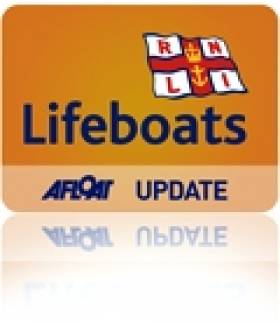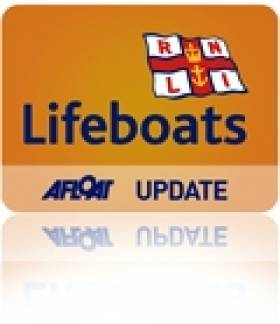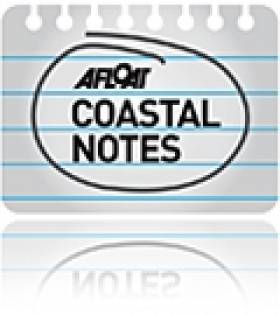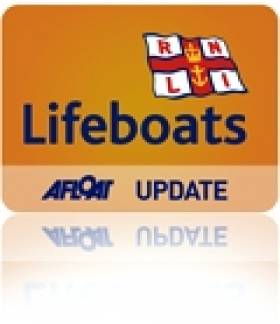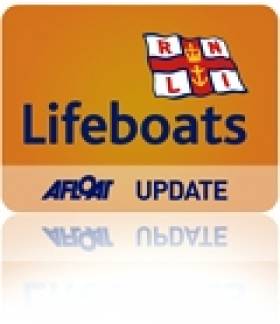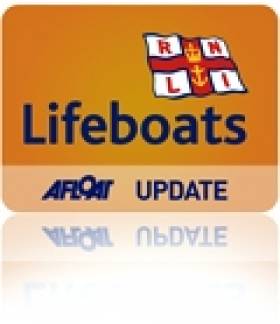Displaying items by tag: Ballycotton
Lifeboat Assists Sinking Fishing Vessel in Cork Harbour
Yesterday while out on exercise in a squally southwesterly force four winds the crew of the Ballycotton lifeboat Austin Lidbury received details of a 26 foot fishing vessel that had sunk off Roches Point, at the mouth of Cork Harbour. The two crew members had taken to a liferaft and were retrieved by a fishing vessel in the area. Crosshaven lifeboat also launched and was first on scene. Ballycotton lifeboat was stood down and returned to station.
Related Safety posts
RNLI Lifeboats in Ireland
Safety News
Rescue News from RNLI Lifeboats in Ireland
Coast Guard News from Ireland
Water Safety News from Ireland
Marine Casualty Investigation Board News
Marine Warnings
Ballycotton Lifeboat Launches for Pleasure Craft in Choppy Seas
Ballycotton RNLI lifeboat was launched at 12:10 today for a pleasure craft in the Ballycotton Bay area of East Cork.
No contact had been made with the lone sailor for over an hour and his concerned family contacted the Coast Guard.
Sea conditions in the area was choppy at the time, with the wind blowing North East force 6/7.
The Ballycotton RNLI lifeboat, Austin Lidbury, were requested to launch, as were the Ballycotton Coast Guard unit and the Waterford based Coast Guard helicopter, Rescue 117.
The pleasure craft returned safely to shore under its own power shortly afterwards and the emergency units were stood down.
Related Safety posts
RNLI Lifeboats in Ireland
Safety News
Rescue News from RNLI Lifeboats in Ireland
Coast Guard News from Ireland
Water Safety News from Ireland
Marine Casualty Investigation Board News
Marine Warnings
Coastal Harbours Benefit from Infrastructure Funding
Malahide is one of over a dozen harbours around the coast to benefit from an announcement by Sean Connick TD, Minister of State at the Department of Agriculture, Fisheries and Food today that funding has been approved for harbour development projects in Local Authority owned harbours under the Fishery Harbour and Coastal Infrastructure Development Programme 2010.
Funding has been approved for projects that have been identified as priorities by each of the five Local Authorities listed below. Up to 75% of the cost of an approved project (subject to the maximum figure approved) will be available for each project with the Local Authority providing the balance. The project must be completed and funding drawn down before the end of the current calendar year. The projects are located in harbours around our coastline that are in Local Authority ownership.
Minister Connick said “The Local Authority owned fishing harbours supplement and underpin the activities undertaken in our Department of Agriculture, Fisheries and Food owned Fishery Harbour Centres. These harbours are of great importance to the fishing and aquaculture industries and provide much needed employment and support for economic activity in our coastal communities. I am delighted to be able to announce the provision of this funding to enhance and develop these facilities”.
The following is a list of the Local Authorities that have been approved funding:
|
Local Authority |
Approved Funding |
||
|
FINGAL COUNTY COUNCIL |
|||
|
Malahide - Repair to slipway |
€55,875 |
||
|
SLIGO COUNTY COUNCIL |
|||
|
Mullaghmore Harbour - Dredging of harbour |
€90,000 |
||
|
CORK COUNTY COUNCIL |
|||
|
Ballycotton - Breakwater Emergency works |
€225,000 |
||
|
WEXFORD COUNTY COUNCIL |
|||
|
Fethard harbour 1 - Fishing harbour and slipway study |
€18,750 |
||
|
Fethard Harbour 2 - Fishing harbour and slipway |
€7,500 |
||
|
Kilmore Quay Harbour - Provide a new laydown area at the end of West Pier |
€54,750 |
||
|
Courtown Harbour 1 - Health & Safety improvements |
€18,750 |
||
|
Duncannon & Hook Peninsula Piers - New CCTV system & Harbour Repairs |
€56,250 |
||
|
WEST CORK COUNTY COUNCIL |
|||
|
Castletownbere - Bank Harbour |
€18,422 |
||
|
Bantry- Doneen Pier |
€23,288 |
||
|
Schull - Lahertanavally Pier |
€24,375 |
||
|
Schull - Ballycummisk Pier |
€19,916 |
||
|
Castletownbere - Trafrask Pier |
€18,422 |
||
|
Western Division - Safety Works |
€46,369 |
||
|
Bantry Pier - Public Toilets |
€30,000 |
||
|
|
|
|
|
|
|
|
Total Estimated Cost |
€707,667 |
Trawler Fouls Prop, Calls Lifeboat for Tow
Ballycotton lifeboat was called on to lend assistance to a 23 metre fishing vessel in difficulties, 31 miles south of Ballycotton today. The Irish registered vessel, with five on board, contacted the emergency services when they fouled their propeller. The Ballycotton lifeboat, Austin Lidbury, arrived on scene at 12:00 and established a towline. The vessel was safely towed to Ballycotton harbour.
Related Safety posts
RNLI Lifeboats in Ireland
Safety News
Rescue News from RNLI Lifeboats in Ireland
Coast Guard News from Ireland
Water Safety News from Ireland
Marine Casualty Investigation Board News
Marine Warnings
Vessel Towed to Ballycotton Harbour by Lifeboat-Update
Ballycotton RNLI lifeboat launched today, 12 July, to lend assistance to a 40 foot pleasure craft that ran into difficulties one mile east of Ballycotton lighthouse. The pleasure craft fouled its propeller on rope while on passage and sought assistance. A lifeboat crewmember was put aboard the pleasure craft and attempts were made to free the offending rope but without success. A towline was established and the casualty was towed to Ballycotton harbour, where they arrived safely at 16:00.
Related Safety posts
RNLI Lifeboats in Ireland
Safety News
Rescue News from RNLI Lifeboats in Ireland
Coast Guard News from Ireland
Water Safety News from Ireland
Marine Casualty Investigation Board News
Marine Warnings
Ballycotton RNLI lifeboat assists 31 ft. yacht
Ballycotton Lifeboat Tows Fishing Boat
Ballycotton RNLI lifeboat launched at 04:10 this morning, Sunday 9 May, for the second time in one night. They went to assist a 44ft Irish fishing vessel with a fouled propeller 37 miles south east of Ballycotton. The wind at the time had picked up and conditions were fresh. A towline was established and the fishing vessel is being towed to Ballycotton.


























